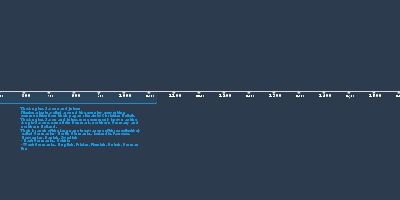The Vikings - Norsemen and Danes: These invaders from Sweden, Norway & Denmark, collectively known as ‘Vikings’ , ‘Norsemen’ or ‘Danes’ brought with them their own language – ‘Old Norse’ – which was also Germanic. After a series of battles with the English armies, the Viking invaders settled in the north and east of England, a region that would later become known as ‘Danelaw’. Over time, as trade increased and inter-marriage occurred, Old English speaking communities began to absorb Norse words (1 ene 800 año – 1 ene 1066 año)
Descripción:
These invaders from Sweden, Norway & Denmark, collectively known as ‘Vikings’ , ‘Norsemen’ or ‘Danes’ brought with them their own language – ‘Old Norse’ – which was also Germanic.After a series of battles with the English armies, the Viking invaders settled in the north and east of England, a region that would later become known as ‘Danelaw’. Under the terms of the Treaty of Wedmore (878), the Vikings were forbidden from travelling into the south and west of England (known as Wessex) unless they were trading.
Initially, the two groups would have found it difficult to communicate, despite their shared linguistic
background. But over time, as trade increased and inter-marriage occurred, Old English speaking communities began to absorb Norse words into everyday use.
A merging of grammatical features also occurred, most notably the loss of many inflectional word endings and the more frequent use of prepositions.
Geographical terms are evident once again, with -by meaning ‘farm’ (eg, Corby, Newby), -thorpe meaning ‘village’ (eg, Scunthorpe) and -thwaite meaning ‘portion of land’ (eg, Bassenthwaite). Other words with Viking origins, such as beck meaning ‘stream’ and garth meaning ‘paddock’, are evident in some dialects still used in the north-east of England.
The use of -son (-sen) meaning ‘son of’ is evident in surnames such as Gibson, Robinson, Watson and Petersen. Many English words beginning with the /sk/ sound have Viking origins, such as score (skor), sky (sky), skive (skifa) and skull (skule).
Other loan words from this time include ‘anger’ (angr), ‘freckle’ (freknur), ‘knife’ (knif) , ‘ransack’ (rannsaka), ‘smile’ (smile), ‘thrust’ (thrysta) and ‘wrong’ (rangr).
Note that not all of these words were new. Words such as ‘ill’ and ‘skill’ were merely the Viking equivalents of the Anglo-Saxon ‘sick’ and ‘craft’. The eventual effect was a greater variety of meaning in the English language.
Añadido al timeline:
fecha:
1 ene 800 año
1 ene 1066 año
~ 266 years
